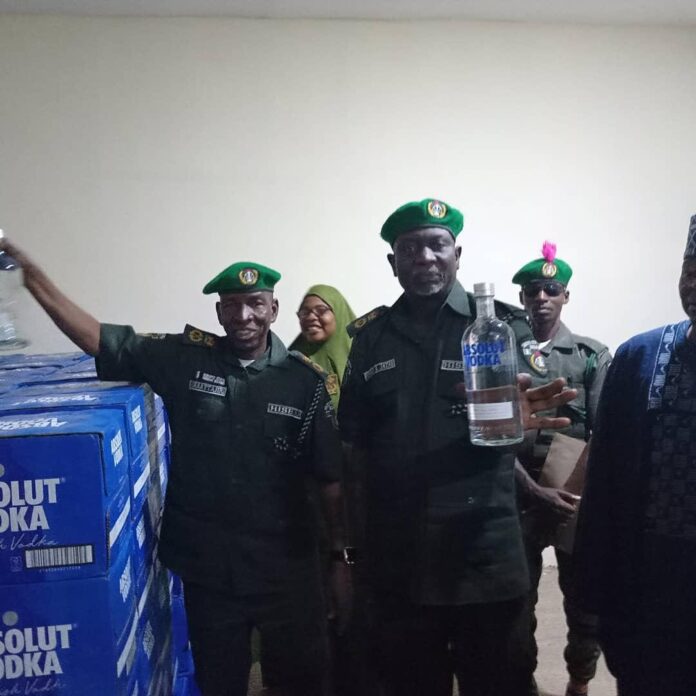Sokoto State Hisbah operatives have intercepted and confiscated over 200 cartons of alcoholic drinks at the Sokoto Central Motor Park.
The seizure was made after a tip-off led Hisbah officers to discover the illegal shipment, which they suspect contained alcoholic beverages.
Speaking to journalists at the Hisbah board office, Commander Usman Jatau confirmed that the cartons were intercepted during a routine operation.
“No one has come forward to claim the confiscated goods,” Jatau said. “We will now consult with the state commissioner for justice and attorney general to determine the next steps.”
This confiscation highlights the ongoing efforts by Sokoto Hisbah to enforce the state’s regulations on prohibited substances and behaviors.
The state of Sokoto, like many others in northern Nigeria, operates under a strict interpretation of Islamic law, which prohibits the sale and consumption of alcoholic drinks.
The seizure at the Sokoto Central Motor Park is just the latest in a series of operations aimed at curbing illegal alcohol sales and other activities deemed inappropriate under Sharia law.
Jatau also addressed the public on the set of rules and regulations that residents must follow, emphasizing the importance of living in accordance with Islamic principles.
The Hisbah board, which is tasked with promoting Islamic values and enforcing Sharia law in Sokoto, has been active in monitoring public spaces and ensuring that individuals adhere to these guidelines.
“The rules are not meant to target anyone for witch hunts or to disrupt the peaceful nature of the state,” Jatau explained. “They are simply guiding principles for daily activities in Sokoto.”
Among the rules that residents are expected to follow are those related to dress codes, social interactions, and business conduct.
Jatau stressed that these regulations are in place to maintain a peaceful and moral environment for everyone living in Sokoto.
According to the Hisbah commander, the rules also cover the prohibition of immoral activities, including mingling between unrelated men and women, which is seen as un-Islamic.
“Islamic law requires that people behave in ways that reflect their faith,” he said. “This includes following the rules of dress, avoiding immoral relationships, and ensuring business practices are in line with Shariah law.”
The Sokoto Hisbah board also forbids the sale or consumption of illicit drugs, including alcohol, at any public gathering or event.
“Selling alcohol or other prohibited substances at public events, gatherings, or ceremonies is strictly forbidden,” Jatau added. “We will not tolerate any activities that go against the teachings of Islam.”
Despite the clear rules, Hisbah operatives face challenges in fully eliminating the illegal sale of alcohol and other banned substances, which are sometimes smuggled into the state from neighboring regions.
Sokoto is one of the few states in Nigeria that has a strong Hisbah presence, tasked with maintaining public morals and preventing activities considered harmful to the Islamic way of life.
The Hisbah’s crackdown on alcohol is part of a broader effort to enforce Islamic norms across the state, ensuring that people live in accordance with the principles of Sharia law.
In Sokoto, where a large majority of the population adheres to Islam, the Hisbah is seen as a guardian of religious values, promoting discipline and moral behavior.
Jatau emphasized that the Hisbah’s role is not just about enforcing laws but also about guiding the community toward a more ethical and faithful lifestyle.
“We are here to help people live better lives by adhering to the teachings of Islam,” Jatau said. “This is not just about enforcement but about helping people understand what is right and wrong.”
While some residents support the Hisbah’s actions, others have raised concerns about the strict nature of some regulations, particularly those that affect personal freedom and lifestyle choices.
Critics argue that while the Hisbah’s role in upholding Islamic values is important, some of the regulations may be overly restrictive, particularly in a modern, diverse society.
Regardless, the Hisbah remains committed to its mission of enforcing Sharia law and maintaining public order.
“We will continue to monitor activities across the state and ensure that people respect the laws,” Jatau said. “Our job is to protect the public from harmful activities, and we will not stop until we achieve that goal.”

